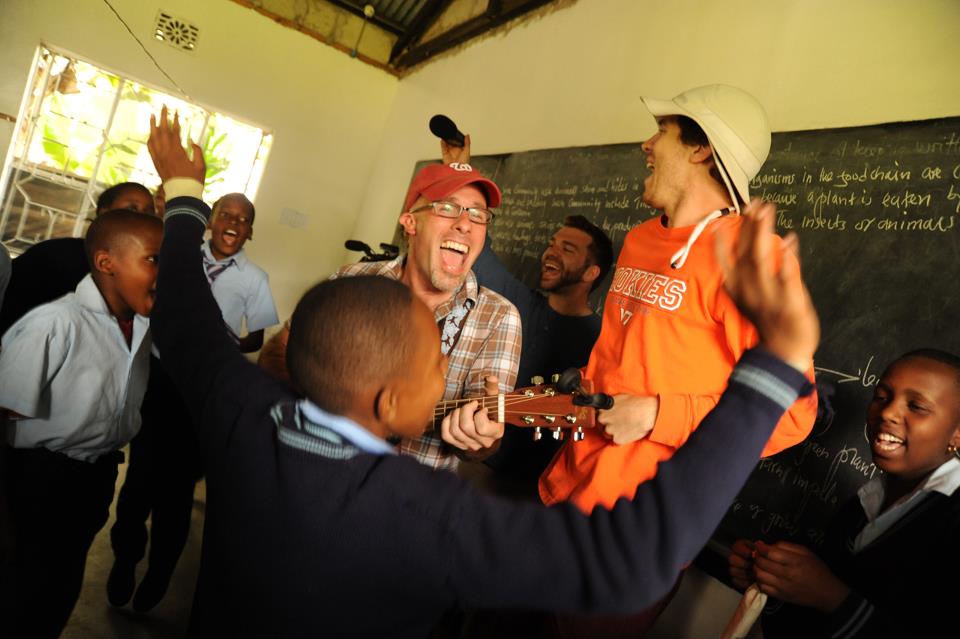We’re fortunate here at Kidzu to be good pals with Robbie Schaefer, creative polymath who knows a thing or two about what makes kids tick when it comes to music and the arts.
Consider just a few of Robbie’s recent or ongoing accomplishments:
– Lead guitarist and singer for the folk band Eddie from Ohio
– Solo recording artist for adults and kids alike
– Founder of One Voice Community, a nonprofit bringing art to the world’s poor and disadvantaged kids
– Playwright and actor for his very own life story
– All-around good guy
Who better, then, for Kidzu to interview than a man who has dedicated a considerable chunk of his life to making music that inspires the child in all of us.
K: What drew you to music for kids?
RS: I kind of stumbled into that side of things because of my own kids. They actually appeared in some of my songs. What really drew me – and draws me – to performing for and with kids is how emotionally accessible and open they are to music. Often kids are more adept at speaking in the language music much more than words.
Music is the language for the language-less place in us.
K: Why is music so effective with kids and adults alike?
RS: You’ll hear people say that music is universal. But I’d alter that a bit to instead say that music elicits a universal emotional response in us. Music is the language for the language-less place in us.
K: Do you find that important for kids?
RS: Yeah, I do. Music with kids is a bit like fertilizer or water for a plant. It brings out something that life can bury very quickly. You can see it in a kid’s eyes when you connect with them via music. Something remembered shows up.
K: You’ve spent a lot of time in poor villages in Africa and India and more recently in the refugee camps. What does music do for child refugees?
RS: Most of these kids have been bouncing around from place to place, homeless, facing food shortages, not speaking the language. So there’s obviously a real deficit in their lives when it comes to music and the arts. When we introduce this common language of music, in a matter of hours or days we literally watch these refugee kids start to re-inhabit their own skin. A little glimmer of confidence reappears, like, ‘Oh yes, I remember this world.’
We literally watch these refugee kids start to re-inhabit their own skin.
K: How do kids and music differ around the world?
RS: Kids love ritual, structure, repetition. You don’t see a lot of that here in the West other than with kids in a particular discipline – like learning an instrument or in the school band. So when I do a song writing workshop, I make sure that every day begins and ends with the same music ritual. Maybe it’s just singing the same song each day while facing each other, then the next day, same song, different kid across from you. You can think of it as opening and then closing the experience each day.
K: We like to say that kids teach us as much as we adults teach them. Have you found that to be true?
RS: Absolutely. Kids will often surprise you. In Nicaragua, this school we [One Voice] were at didn’t have a music program. This boy named Richard – who fancied himself a lady’s man and class clown – was always interrupting class, making faces. One day I gave the kids a chorus and told them they had to create the lyrics, and the theme was family. Well, the next day Richard comes back with three verses of a Rap song about family being what you choose vs. what you are born with. Now, the point here is nobody was assigned homework and nobody else got it done that fast. But music opened up something in Richard that compelled him to create and share.
K: In your experience, at what age do kids stop being so open?
RS: Kids can start losing this as early as 4th or 5th grade. I attribute it to that peer-driven desire to conform. And here in the West, there is a growing pressure to achieve vs. to create. If I compare songwriting between 2nd and 5th graders, those older kids are not willing to fail, to take a chance, to look silly.
The creative process encourages failure – it depends on it.
K: Which is a shame.
RS: Which is a real shame, yes. Because music gives us permission to be silly, to fail. The creative process encourages failure, it depends on it, and kids can only grow if they’re willing to take risks and fail.
K: Is this a global problem?
RS: I see it more in the U.S. than in other countries, and I attribute that to the entertainment culture and how it’s being sold to younger and younger audiences. Which means kids are facing the need to conform at younger and younger ages. In poorer places like India or Nicaragua where entertainment isn’t nearly as prevalent in the lives of kids, I see much older kids still willing to take a chance, still lacking in the inhibitions that really thwart kids in the U.S.
K: OK, so what can parents do to keep music and the arts alive in their kids, especially as they grow older?
RS: There are a few things parents can do.
First, I always urge parents to make a habit of offering new things to their children, because you never know which one is going to light that inner fire.
Second, don’t tie achievement to these experiences. In the U.S. in particular, we’re so consumed with achievement we forget that without failure creativity isn’t even possible. The achievement will come if they learn to experiment with and love what they do.
Third, don’t force your child to take piano or guitar or participate in the band. If they feel forced they’ll likely hate it and if they hate it they’re going to abandon it the first chance they get. And maybe resent you as well. I mean, how many adults do you know who were forced to take piano lessons, yet haven’t touched a piano in years? It’s almost a cliche, right?
Fourth, practice what you preach or, better yet, play the music and sing the songs and grab your mate and dance in the kitchen. Show your kids your own love and appreciation for music, don’t just foist them off on some instructor. Kids always mimic their parents first. If you’re touting music in a music-less house, your words are going to ring hollow.
Lastly, take a chance yourself, be a kid again, try something new. In a riff on Gandhi’s famous quote, why not ‘be the change you want to see in your child.’ How cool would it be to say:
“Mom is taking a painting class.”
“I didn’t know mom paints.”
“She doesn’t. But she’s trying.”
It’s harder for us, it takes time and effort, but how much more rewarding is that for all involved? And joyful.
K: Thanks Robbie.
RS: My pleasure!
